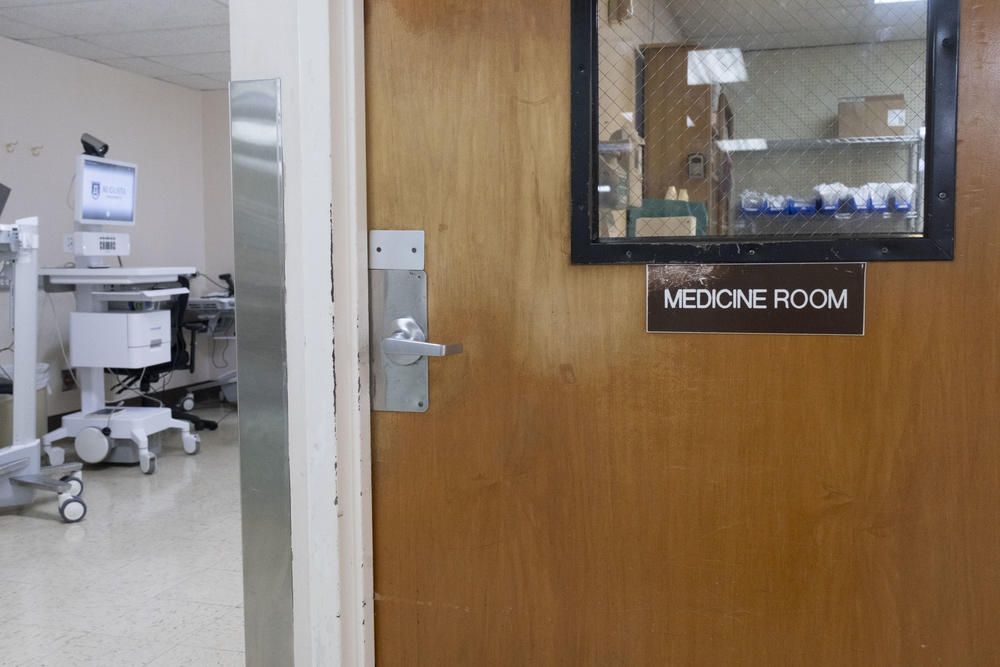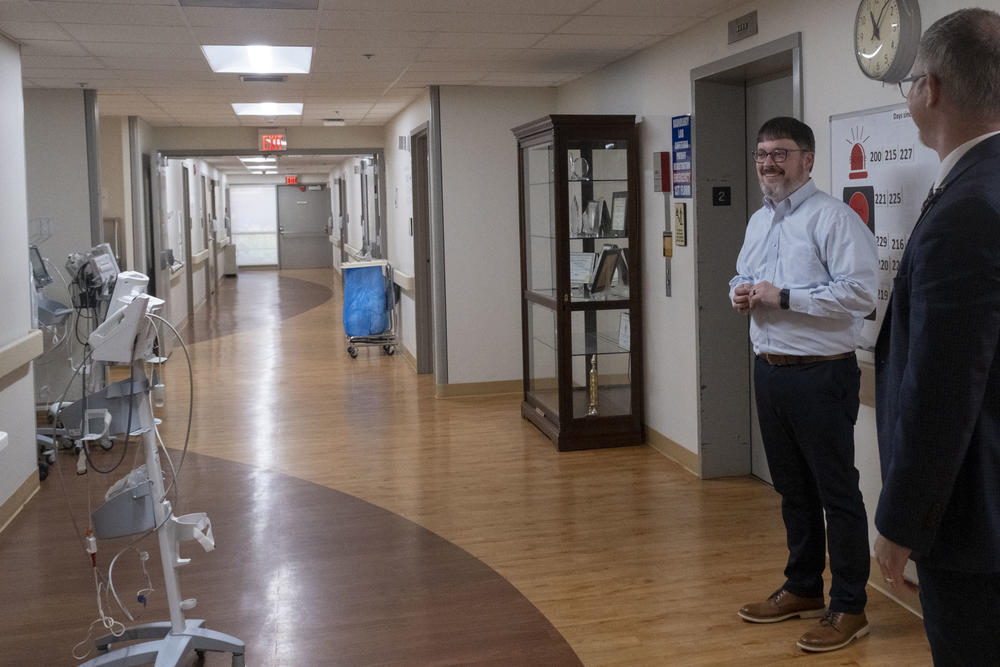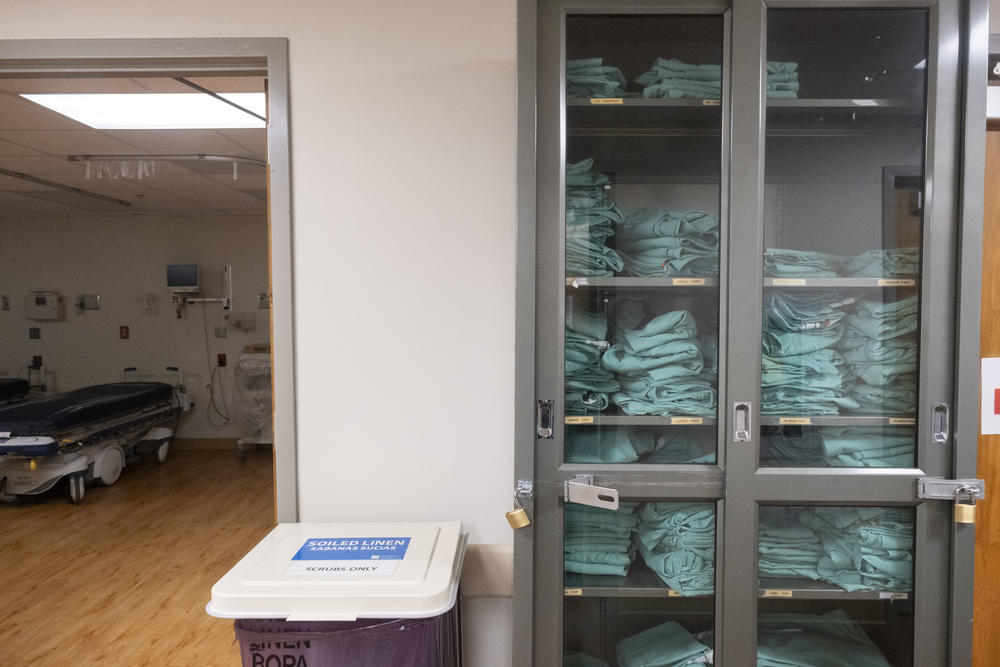
Caption
An old sign on a door inside Washington County Regional Medical Center in Sandersville, Ga., remains. The hospital was built in the 1960s.
Credit: Sofi Gratas/GPB News
|Updated: August 16, 2024 10:10 AM
LISTEN: Rural hospitals sometimes look for lifelines through consolidation with big city hospitals. Now a couple of rural hospitals in Middle Georgia are trying a grassroots approach emphasizing local ownership. And, they say, it’s working. GPB's Sofi Gratas reports.
Walking down the halls of Washington County Regional Medical Center in Sandersville, Pam Stewart said this place has always felt like home.
“So my mother was food service manager and dietician here,” Stewart said, near one of the hospital's vending machines. “I'd be in the kitchen with my mom, helping her get the food ready, making sure it got up to the patients. … I grew up here.”
What started as a temporary placement for her family turned into a years long stay. Working as a candy striper, and eventually a nurse, Stewart got to know the hospital well. She became CEO late last year.
Washington County Regional is small, but it’s the only hospital within an hour of Macon or Augusta. With just over 50 licensed beds, Stewart said she hopes to keep at least 25 beds occupied at all times.
She admits the hospital, built in the 1960s, needs some updating. For example: upstairs in one of the hospital's inpatient suites.
“Old beds; old bedside — I mean, nothing matches,” she said. “Look at the chair over there, that somebody has to sit in.”

An old sign on a door inside Washington County Regional Medical Center in Sandersville, Ga., remains. The hospital was built in the 1960s.
Stewart said people noticed, filing complaints on social media about amenities and wait times. While no hospital is immune from poor public opinion, that can be deadly for a small rural hospital like Washington County Regional that relies on local patients to make a profit.
“Years ago, when you talked about Washington County Regional Medical Center in the community, you often heard it's a Band-Aid station; I wouldn't take my dog there,'” Stewart said.
But they didn’t have the cash to change many things, because for years the hospital has struggled to meet its bottom line.
In just over a decade, 18 hospitals in Georgia have closed, three-quarters of which served rural communities.
Those that have managed to stay afloat have sometimes looked for lifelines through consolidation with big city hospitals.
A few years back, Washington County Regional signed an agreement to be managed by Augusta University Medical Center.
Jim Croome, chairman of the local hospital authority, said the hospital was in need of extra assistance at the time. It had recently received a $15 million loan approved by local taxpayers for capital and operating expenses and was trying to come up with a plan for longer-term sustainability.
That included a training plan for doctors in the emergency room by doctors from Augusta. Ultimately, Croome said hospital staff didn’t receive the support they expected.
“They didn't really know how to run a rural hospital,” Croome said of the Augusta-based management.
Croome also said contracting with the doctors from Augusta was too expensive.
“In the end, we ended up with interns in the emergency room, but we had to pay them a pretty high amount of money per hour,” Croome said.
As more patients from Washington County Regional were transferred out for care to the bigger, more modern Augusta hospital, profits followed those patients, and local trust for the local brand took a hit.
Matt Lyon, director at the Medical College of Georgia, remembers when the management deal with Washington County Regional fell through. He agrees that cost played a big part, but that the deal was always meant to be temporary.
“We're an academic health center,” Lyon said. “Going to a rural hospital, the volumes are lower, it's just more costly for us to be there.”
Since then, Augusta University Health, now under Wellstar, has transitioned to a telemedicine model of support. There are 15 rural hospitals, including Washington County Regional, that use that program.
Lyon said that’s helped keep patients in rural hospitals, and keep the emergency room in Augusta from being clogged with transfers.
By the time Pam Stewart came back to Washington County, the hospital had been through layoffs and a pandemic. Staff were considering a new management company.
“And I’m thinking, 'Please don’t,'” Stewart said. But she also said she was “cautiously optimistic.”

Kerry Trapnell of Aletheia Health Partners stands in the hallway of Monroe County Hospital with former CEO Terrell Neal.
This time, the hospital signed with Kerry Trapnell and his company Aletheia Health Partners. Trapnell had been consulting with Washington County Regional and other rural hospitals prior, and for years had run a pharmaceutical company.
“They kept telling us 'this is the first time we've ever heard a plan,'” Trapnell said.
Aletheia started managing Washington County Regional in 2022. By cutting costly agency nurses, full-time nurses got a pay raise. Trapnell helped apply for over $2 million in grants, which staff said they didn’t even know were available.
“Just like common sense, practical things,” said Chris Hutchins with the Washington County commission. “And you sit there and say, 'why didn't you do this 20 years ago?'”
Trapnell has also been working to correct misconceptions about the level of care available at the hospital, which is usually more than most people think. At the same time, by looking at what services are routinely used or requested by returning patients, Trapnell’s plan includes investing in those services.
An example is dialysis, for which 15 to 20 patients who live in Sandersville currently travel to Augusta, according to hospital staff.
“Rural hospitals will not survive if you try to survive by cutting services and cutting expenses,” Trapnell said.
The community seems to agree. Commissioners approved another $15 million in bonds for emergency room renovations in June.
“We need to get out of this crisis mode that we've been in, and we're out of that now,” Croome said. “And now we need to build for the future.”
Out in the parking lot of the hospital, Sandersville resident Derrick Dunn said he knows people who bypass Washington County Regional for what they see as bigger hospitals with better care.
“For a person to take a chance and go 20 miles away versus 10, that's that says a lot,” Dunn said.
Hearing about the new management, Dunn seems hopeful.
“I pray that they be able to reach out to the community and get them to trust them again,” Dunn said.
If they succeed in getting that trust, people like Dunn might keep health care closer to home for longer.
About 80 miles away at Monroe County Hospital in Forsyth, Alethea Health Partners is just starting the same process of building trust. The company signed a management deal with Monroe last fall.

The empty, downstairs operating room at Monroe County Hospital in Forsyth.
“I think this is the first time in our careers, for the most part, that we can breathe a little bit easier,” Chief Operating Officer Megan Randall said.
Randall is a longtime employee at Monroe, which recently cut ties with the much larger Atrium Health Navicent, out of Macon. For the first time in years, Monroe is making more money than it’s losing.
“Having the ability to make decisions more at the local level, in regards to our current needs, is the biggest improvement,” Randall said.
That includes decisions around marketing, which Randall said have been far more focused on Monroe County Hospital and its services than on the previous partnership with Atrium.
This newfound independence has come with some high stakes. Former CEO Terrell Neal resigned after only four months at Monroe County Hospital — a mutual decision, Trapnell said, based on what he described as a clash with the “vision” and “culture” at the hospital. Neal did not respond to requests for comment.
Staff at both hospitals say Alethia's investments made under their local advice are already leading to more admissions, and financial stability.
The hospital’s operating room is scheduled to reopen after over four years of being closed, a decision made under Atrium's management. Inside the currently empty operating rooms, interim surgical manager Shawnelle Lupton sat among unplugged equipment, prepping.
She said the management transition has been positive.
“Any of the changes that need to take place in this department in the operating room to get it back up, and back to standard, they've been extremely open to,” Lupton said.
She hopes investments like this, which benefit both patients and staff, aren't temporary.